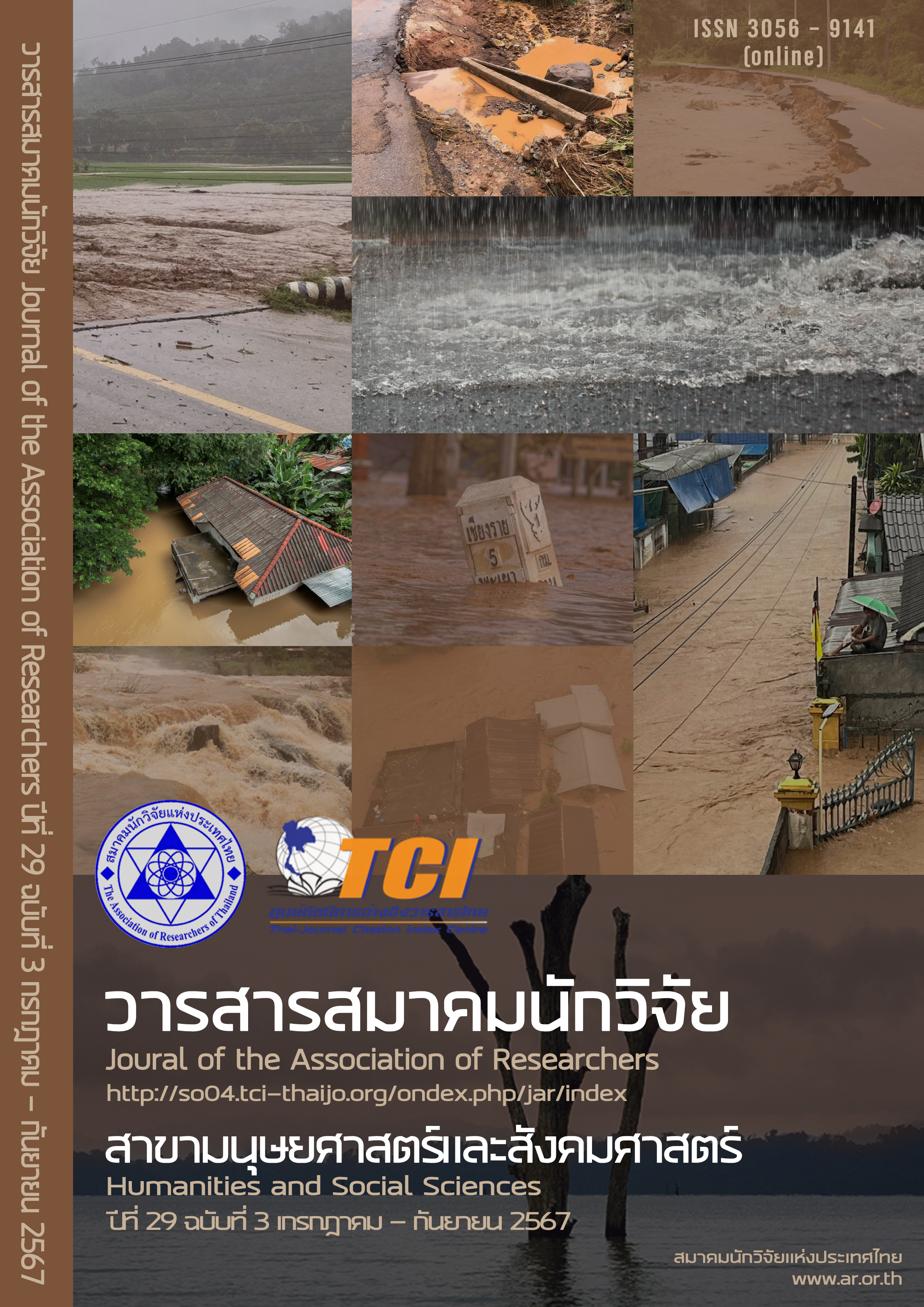Factors Effecting Employee Innovative Performance of Digital Nomads in Digital Marketing Business
Main Article Content
Abstract
The study aims to study factors affecting the innovative self-efficacy of digital nomad employees in the digital marketing business living in Thailand. The tool used for collecting data was an online questionnaire via Google Forms. Data was processed and analyzed by statistical package IBM SPSS AMOS 24. Descriptive statistics analyze basic statistical values such as frequency, percentage, mean, and standard deviation, while inferential statistics analyze the indices of conformity for the Structural Equation Model such as Related Chi square, Adjusted Goodness of Fit Index (AGFI), and Root Mean Square Error of Approximation (RMSEA), and analyze the regression coefficients of variable. The results of the study found that the majority of the sample were male, aged 26 - 30 years, single status, studying at the bachelor's level. Work experience of 4 - 8 years with an average monthly income of 15,001 - 30,000 baht and employee work engagement, sustainability concerns, entrepreneurial capability, organizational innovative climate, and innovative capability positively influenced innovative self-efficiency. Also, innovative self-efficiency has been found to have its positive impact on employee innovative performance.
Article Details

This work is licensed under a Creative Commons Attribution-NonCommercial-NoDerivatives 4.0 International License.
บทความที่ปรากฏในวารสารนี้ เป็นความรับผิดชอบของผู้เขียน ซึ่งสมาคมนักวิจัยไม่จำเป็นต้องเห็นด้วยเสมอไป การนำเสนอผลงานวิจัยและบทความในวารสารนี้ไปเผยแพร่สามารถกระทำได้ โดยระบุแหล่งอ้างอิงจาก "วารสารสมาคมนักวิจัย"
References
โกเมนทร์ ชินวงศ์. (2565). อิสรภาพชีวิตคืออุดมคติชีวิต. วารสารสิรินธรปริทรรศน์. 23(2), 1-13.
จาตุรนต์ ชุติธรพงษ์. (2553). การจัดการความรู้เพื่อสร้างสรรค์นวัตกรรมของบุคลากรสายปฏิบัติการวิชาชีพของมหาวิทยาลัยในกำกับของรัฐ. วิทยานิพนธ์. มหาวิทยาลัยวลัยลักษณ์.
ณภัทร ทิพย์ศรี และคณะ. (2560). ความสามารถการเป็นผู้ประกอบการกับความสำเร็จในการประกอบธุรกิจ วิสาหกิจขนาดกลาง และขนาดย่อมในจังหวัดเชียงราย. วารสารบัญชีปริทัศน์, 2(1), 1-14.
นิรันดร์ จงวุฒิเวศย์. (2549). การจัดการความรู้สู่การพัฒนาที่ยั่งยืน. วารสารพัฒนาชุมชน, 45(4), 8-10.
วรมรรณ นามวงศ์ และคณะ. (2562). คุณลักษณะการเป็นผู้ประกอบการของเจ้าของธุรกิจค้าปลีก ที่เข้าร่วมโครงการธงฟ้าประชารัฐกรณีศึกษา: พื้นที่ภาคเหนือตอนบนของประเทศไทย. วารสารบริหารธุรกิจมหาวิทยาลัยแม่โจ้, 1(1). 19 ตุลาคม 2562, 48-59.
สบพันธ์ ชิตานนท์. (2549). เศรษฐกิจเพียงพอ “หนทางสู่การพัฒนาที่ยั่งยืน. กรุงเทพฯ: กรมโยธาธิการและผังเมือง.
สัญญา เคณาภูมิ. (2551). ความสำเร็จของวิสาหกิจชุมชนใน 4 จังหวัดชายแดนลุ่มน้ำโขง. วิทยานิพนธ์. มหาวิทยาลัยราชภัฏวไลยลงกรณ์ ในพระบรมราชูปถัมภ์.
สิริวดี ชูเชิด. (2556). การศึกษาสภาพการบริหารงานกิจการนักศึกษามหาวิทยาลัยราชภัฏสวนดุสิต. สารนิพนธ์. มหาวิทยาลัยศรีปทุม.
อรพรรณ คงมาลัย และ อัญณิฐา ดิษฐานนท์. (2561). เทคนิควิจัย ด้านการบริหารเทคโนโลยีและนวัตกรรม. กรุงเทพฯ: มหาวิทยาลัยธรรมศาสตร์.
Berkley. (1975). The Craft pf Public Administration. Boston: Allyn and Bacon.
Bos-Nehles, A.C., Bondarouk, T. and Nijenhuis, K. (2017), “Innovative work behaviour in knowledge-intensive public sector organizations: the case of supervisors in the Netherlands fire services”. The International Journal of Human Resource Management, 28(2).
Carberry, et, al. (2012). Work in progress: Developing an Innovation Self-efficacy survey. 42nd Annual Frontiers in Education Conference, FIE 2012.
Chevtaeva, E. (2021). Coworking and Coliving: The Attraction for Digital Nomad Tourists. Information and Communication Technologies in Tourism 2021, 12 January 2021, 202–209.
Coulter, M. (2003). Entrepreneurship in action. Prentice Hall.
Dessler, G. (1976). Organization and Management: A Contingency Approach. Englewood Cliffs, New Jersey: Prentice-Hall, Inc.
Greco and De Jong. (2017). Sustainable entrepreneurship: definitions, themes and research gaps. Working Paper, May 2017.
Guan, J., & Ma, N. (2003). Innovative Capability and Export Performance of Chinese Firms. Technovation, 23, 737-747.
Hogan, S., Soutar, G., McColl-Kennedy, J., & Sweeney, J. (2011), Reconceptualizing professional service firm innovation capability: scale development. Industrial Marketing Management, 40(8), 1264-1273.
Hult, G.T.M., Snow, C.C., Kandemir, D., (2003). The role of entrepreneurship in building cultural competitiveness in different organizational types. Journal of Management, 29 (3), 401–426.
Lawson, B., and Samson, D. (2001). Developing Innovation Capability in Organisations: A Dynamic Capabilities Approach. International Journal of Innovation Management (ijim), 5(03), 377-400.
Li, Q. (2021). The improvement path of corporate organizational performance from the perspective of organizational culture. Business Culture, (28), 83-84.
Minh VU. (2020). A Review of Dynamic Capabilities, Innovation Capabilities, Entrepreneurial Capabilities and Their Consequences. Journal of Asian Finance Economics and Business, 7(8), August 2020, 485-494.
Mokhber et al. (2016). Impact of Entrepreneurial Leadership on Organization Demand for Innovation: Moderating Role of Employees’ Innovative Self-Efficacy. International Review of Management and Marketing, 6(3), May 2016, 415-421.
Mourato et al. (2023). Estimating the Impact of Digital Nomads’ Sustainable Responsibility on Entrepreneurial Self-Efficacy. Social Sciences, 12(97), 2023, 1-14.
Noble, C., Sinha, R. and Kumar, A. (2002). “Market orientation and alternative strategicorientations: a longitudinal assessment of performance implications”. Journal ofMarketing, Vol. 66, pp. 25-39.
Shimp, T.A. (1996). Promotion Management and Marketing Communications. The Dryden Press.
Szymanski, D.M. and Henard, D.H. (2001). Customer Satisfaction: A Meta-Analysis of the Empirical Evidence. Journal of the Academy of Marketing Science, 29, 16-35.
William Erwin. (1976). Participation Management: Concept Theory and Implementation. Atlanta G.: Georgia State University.
Yépez, et, al. (2020). Sustainable entrepreneurship: Review of its evolution and new trends. Journal of Cleaner Production, 252, 10 April 2020.
Zhao, T., Zhang, Z., and Liang, S. K. (2020). Digital economy, entrepreneurship, and high-quality economic development: empirical evidence from urban China [J]. Manage World 36, 65–76.
Zhou, J., & George, J. M. (2001). When job dissatisfaction leads to creativity: Encouraging the expression of voice. Academy of Management Journal, 44(4), 682–696.
Translates in Thai Reference
Chinnawong,. K. (2022). Freedom of life is the ideal of life. The Journal of Sirindhornparithat. 23(2), 1-13. (in Thai)
Chutithornpong. C. (2010). Knowledge management for innovation creation of professional personnel of state-controlled universities. Thesis. Walailak University. (in Thai)
Chitanon. S. (2006). Sufficiency Economy: A Path to Sustainable Development. Bangkok: Department of Public Works and Town & Country Planning. (in Thai)
Chuchet. S. (2013). A study of the student affairs administration situation at Suan Dusit Rajabhat University. Thesis. Sripathum University. (in Thai)
Jongwutthiwet. N. (2006). Knowledge management for sustainable development. Community Development Journal, 45(4), 8-10. (in Thai)
Kennapoom. S. (2008). The success of community enterprises in 4 border provinces of the Mekong River Basin. Thesis. Valayalongkorn Rajabhat University under Royal Patronage. (in Thai)
Kongmalai, O & Disthanon., A. (2018). Research Techniques in Technology and Innovation Management. Bangkok: Thammasat University. (in Thai)
Namwong, W. et al. (2019). Entrepreneurial characteristics of retail business owners participating in the Pracharat Blue Flag project: a case study of the upper northern region of Thailand. Maejo University Journal of Business Administration, 1(1). October 19, 2019, 48-59. (in Thai)
Thipsri, N. et al. (2017). Entrepreneurial capability and success in doing business in medium and small enterprises in Chiang Rai Province. Journal of Accountancy, 2(1), 1-14. (in Thai)


